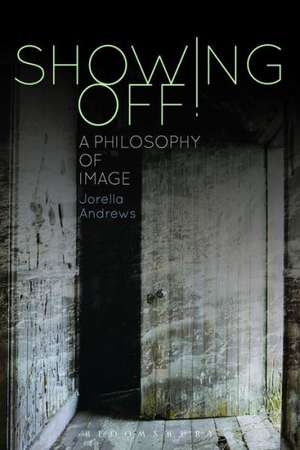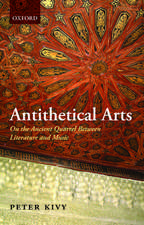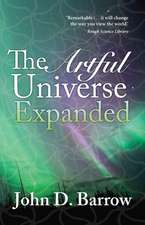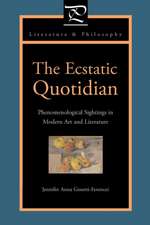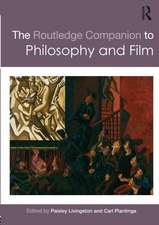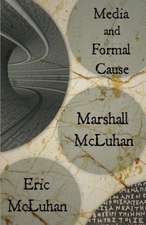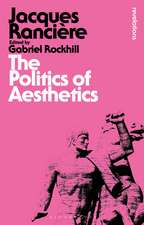Showing Off!: A Philosophy of Image
Autor Jorella Andrewsen Limba Engleză Paperback – 30 iul 2014
| Toate formatele și edițiile | Preț | Express |
|---|---|---|
| Paperback (1) | 180.95 lei 3-5 săpt. | |
| Bloomsbury Publishing – 30 iul 2014 | 180.95 lei 3-5 săpt. | |
| Hardback (1) | 570.02 lei 6-8 săpt. | |
| Bloomsbury Publishing – 30 iul 2014 | 570.02 lei 6-8 săpt. |
Preț: 180.95 lei
Preț vechi: 233.68 lei
-23% Nou
Puncte Express: 271
Preț estimativ în valută:
34.62€ • 37.73$ • 29.18£
34.62€ • 37.73$ • 29.18£
Carte disponibilă
Livrare economică 02-16 aprilie
Preluare comenzi: 021 569.72.76
Specificații
ISBN-13: 9781472526625
ISBN-10: 1472526627
Pagini: 264
Dimensiuni: 156 x 234 x 13 mm
Greutate: 0.46 kg
Editura: Bloomsbury Publishing
Colecția Bloomsbury Academic
Locul publicării:London, United Kingdom
ISBN-10: 1472526627
Pagini: 264
Dimensiuni: 156 x 234 x 13 mm
Greutate: 0.46 kg
Editura: Bloomsbury Publishing
Colecția Bloomsbury Academic
Locul publicării:London, United Kingdom
Caracteristici
Straddles visual culture and philosophy engaging with artworks and artists as well as theorists
Notă biografică
Jorella Andrews is Senior Lecturer in the Department of Visual Cultures at Goldsmiths, University of London, UK.
Cuprins
Acknowledgements Image CreditsText Credits Introduction: Trailer1. Would the Film of Your Life.?2. Appearance is Everything3. Image Wars4. Sacred ConversationsNotes Bibliography Index
Recenzii
A well-informed and sensitive integration of historical and philosophical thinking as a model for [her] feminist art criticism.
Jorella Andrews makes a significant contribution to both visual culture and phenomenological ethics, arguing lucidly against an overwhelming oculocentrism that does not do justice to human engagement in the visual world. Drawing on examples from the breadth of visual culture she brings Maurice Merleau-Ponty's phenomenological insights to life, rigorously arguing for the ethical import of what she calls the agency of self-showing. She convincingly claims there is a human drive to express ourselves visually in terms of display and grounded in the reversibility of seeing and being seen.
In the era of the "selfie," Jorella Andrews takes the idea of "self-showing" as a serious way of reinvigorating the cultural debate around the power of the visual. Against the anti-ocular and iconoclastic theories of visuality that denigrate vision as a mastering sense that dominates and objectifies, she offers a vivacious account of vision where we, as self-showing beings, are drawn into and become part of a lively cast of characters-both human and non-human-who inhabit this world. We are quite simply, self-showing characters existing within a self-showing world. Andrews takes Merleau Ponty's invocation that, 'to see is to enter a universe of beings which display themselves' as a starting point for how we might "see" differently. For Andrews, self-showing is not the solipsistic activity of the selfie, but rather a reciprocal and ethical relation where we inhabit both the risks and the possibilities of our own visible being. If we are prepared to accept this invitation (and how can we not since we are part of it), she prompts us to take our relations seriously but with a lightness of touch, a fleetness of foot and fearlessness that she finds in the artists and artworks that inhabit this book. Her solicitation to engage with the visual with interest and energy offers a refreshing and affirming perspective on the visual field.
Jorella Andrews makes a significant contribution to both visual culture and phenomenological ethics, arguing lucidly against an overwhelming oculocentrism that does not do justice to human engagement in the visual world. Drawing on examples from the breadth of visual culture she brings Maurice Merleau-Ponty's phenomenological insights to life, rigorously arguing for the ethical import of what she calls the agency of self-showing. She convincingly claims there is a human drive to express ourselves visually in terms of display and grounded in the reversibility of seeing and being seen.
In the era of the "selfie," Jorella Andrews takes the idea of "self-showing" as a serious way of reinvigorating the cultural debate around the power of the visual. Against the anti-ocular and iconoclastic theories of visuality that denigrate vision as a mastering sense that dominates and objectifies, she offers a vivacious account of vision where we, as self-showing beings, are drawn into and become part of a lively cast of characters-both human and non-human-who inhabit this world. We are quite simply, self-showing characters existing within a self-showing world. Andrews takes Merleau Ponty's invocation that, 'to see is to enter a universe of beings which display themselves' as a starting point for how we might "see" differently. For Andrews, self-showing is not the solipsistic activity of the selfie, but rather a reciprocal and ethical relation where we inhabit both the risks and the possibilities of our own visible being. If we are prepared to accept this invitation (and how can we not since we are part of it), she prompts us to take our relations seriously but with a lightness of touch, a fleetness of foot and fearlessness that she finds in the artists and artworks that inhabit this book. Her solicitation to engage with the visual with interest and energy offers a refreshing and affirming perspective on the visual field.
